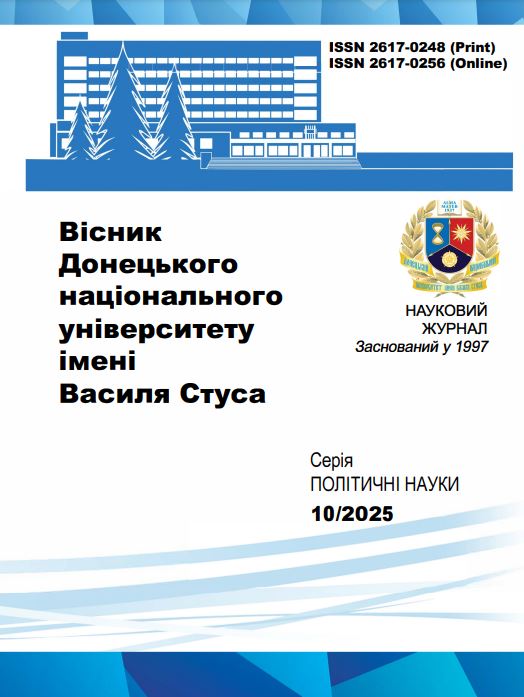Analysis of the main factors of the emergence of international conflicts on the example of Greece and Turkey Resume
DOI:
https://doi.org/10.31558/2617-0248.2025.10.10Keywords:
political conflict, national identity, wars, information policy, democracy, conflict resolution methods, collective sense of ownership, Greek-Turkish relations, propaganda, international conflictAbstract
The article analyzes the main factors of the emergence of international conflicts on the example of Greece and Turkey. It stands to reason that the conflict of interest between the two countries can be rethought to account for the reasons for the failures. It has been proven that it is necessary to solve problems as a prerequisite for better relations. It has been determined that there is no direct enmity or conflict between the two nations. Instead, identities were shaped and constructed according to regime preferences. Therefore, political culture and the idea of states (as they are understood in terms of norms, values and foreign policy orientations) determine totality over identity, since society is subordinate to the state. The political collision of «I» – «Other», «Own» – «Stranger» is considered through the structuring of the surrounding world, we attribute ourselves to a certain group. It was determined that pairs of concepts share primarily «us» and «them». The construction of the Greek “I” and the Turkish “Other” was also shaped according to the hegemonic regime of global modernity, patriarchal Eurocentric identification mechanisms favoring modern, masculine, rational and Western subjects. The cause of the Turkish-Greek conflict is not only the formation of the image of the I-Other, but also the placement of the “Other” in a lower cultural space. In other words, in this conflict, the goal of both sides was to relegate the other to a lower moral space, while promoting themselves to a higher morality. Therefore, the consequence of the Greek “I” of the Turkish “Other” and vice versa plays a role in the current sources of conflict between Greece and Turkey. The concepts used include historical, political, geographical, social variables, etc.
It was found that in order to obtain the results of empirical studies of the «I»-«other» relationship, efforts are needed to develop an analytical toolkit that includes models, scales, and classification schemes that allow different approaches to identity formation to be distinguished.
References
Rumelili, B. (2004). Constructing identity and relating to difference: Understanding the EU's mode of differentiation. Review of international studies. Cambridge. Vol. 30. N 1. P. 27-47.
Norton, A. (1993). Reflections on political identity. Baltimore, MD.: The John Hopkins univ. 209 p.
Buber, Martin (1970). I and Thou. Translated by Walter Kaufmann. New York: Charles Scribner's Sons. 318 p.
International Crisis Group (2012). Aphrodite’s gift: Can Cypriot gas power a new dialogue? Available at: https://www.crisisgroup.org/europe-central-asia/western-europemediterranean/cyprus/aphrodite-s-gift-can-cypriot-gas-power-new-dialogue/
Volkan, V. D. & Itzkowitz, N. (1994). Turks and Greeks: Neighbours in Conflict. Cambridge: The Eothen Press. 69 p.
Couloumbis, T. A. (1983). The United States, Greece and Turkey: The Troubled Triangle. New York: Praeger Publishers. Foucault M. (1980). New York: MacMillan. 263 p.
Coufoudakis, V. (1996). Greek Foreign Policy. Mediterranean Quarterly, 7 (3).
Buzan, Barry. (1991). People, states and fear. Hempstead: Harvester. The national security problem in international relations. Harvest press. Renner Boulder. 233 p.
A Century of Greek–Turkish Relations – A Handbook | Edited by Nikos Christofis and Anthony Deriziotis. ublished: 2024. Mediterranean Politics Series. 128 p.

